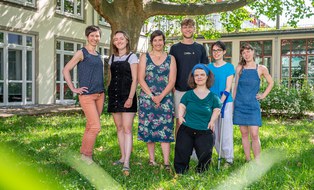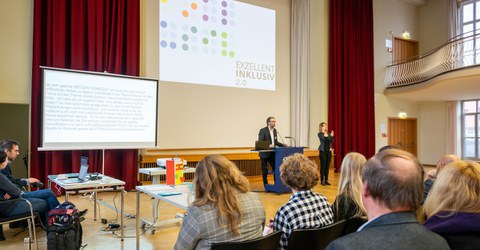Budget for barrier-free events at the TUD
TU Dresden is committed to enabling all people to participate in its events and to making them as accessible as possible, for example, by using written or sign language interpreters or renting mobile ramps or flexible access aids are just a few examples of possible improvements.
Unit 9.3 Diversity Management offers practical advice and supports event organizers with a special budget for accessible events, which can be applied for there informally.
Table of contents
Written interpreting
Written interpreting is a valuable form of support for people who cannot hear spoken content or can only hear it to a limited extent. It is a form of real-time transcription in which all speeches are either typed live or recorded using speech recognition software and then corrected. The generated text is made visible in real-time and can be made available via a projector or digital platforms, for example.
Flexible application options:
- On-site or virtual: written interpreters can either work directly on-site or join in during video conferences. The text can be read on various end devices such as tablets or smartphones.
- Integration via link or QR code: For quick and easy participation, the text is often shared via links or QR codes.
Advantages of written interpreting:
- Diverse target group: in addition to people with hearing impairments, people with a different first language also benefit as they can follow the content more easily.
- Supporting concentration: Written presentations can help to maintain an overview of the discussion or to familiarize oneself more quickly with ongoing conversations.
Sign language interpreting
Sign language interpreters mediate seamlessly between spoken language and sign language in both directions. They enable inclusive communication for deaf and hearing people and make a significant contribution to understanding.
When sign language interpreting makes sense:
- Particularly suitable for people whose first language is sign language, as this is the best and quickest way for them to communicate.
- For people who grew up with spoken language and later developed a hearing impairment, however, written interpreting may be the better choice.
Advantages of sign language interpreting:
- Natural and direct communication: sign language allows for faster, visual and emotional interaction that promotes deeper understanding and inclusion.
- Empowering participation: Deaf people can actively and equally participate in discussions without having to rely on written language.
Sign languages vary by country and region:
- In Germany, Belgium, and Luxembourg, German Sign Language (DGS) is mainly used.
- Austria and German-speaking Switzerland, however, have their variants that differ greatly from DGS.
- There are also different sign languages in English-speaking countries, such as American Sign Language (ASL) or British Sign Language (BSL), which differ, for example, in the finger alphabet (one-handed or two-handed).
It is therefore important to clarify in advance exactly which sign language is required for the event to ensure smooth communication.
Multilingual events
On request, both written and sign language interpreters can translate into English or other languages. This enables a barrier-free and inclusive event that is also accessible to international participants.
Mobile ramps and other possible solutions
Mobile ramps offer a flexible way to reduce barriers in the short term - especially in places that are not barrier-free. They can overcome obstacles such as stairs or steps. Before using them, however, the load-bearing capacity, angle of inclination and, above all, safety should be thoroughly checked to ensure safe use.
Flexible applications, creative solutions
Accessibility means more than simply removing structural obstacles. There is no "one solution" to making an event barrier-free - it is much more a matter of taking a close look at the different needs of the participants and finding individually adapted measures. The key lies in a creative and flexible approach.
Unit 9.3 Diversity Management will be happy to assist you in your search for suitable measures, possible solutions, service providers, or in assessing the range of services on offer.
 © Diversity Management
© Diversity Management
Unit 9.3 Diversity Management
Send encrypted email via the SecureMail portal (for TUD external users only).
Visiting address:
Verwaltungsgebäude 3, 7-208 Nöthnitzer Str. 43
01187 Dresden
Postal address:
TUD Dresden University of Technology
Directorate 9 University culture
Unit 9.3 Diversity Management
01062 Dresden

